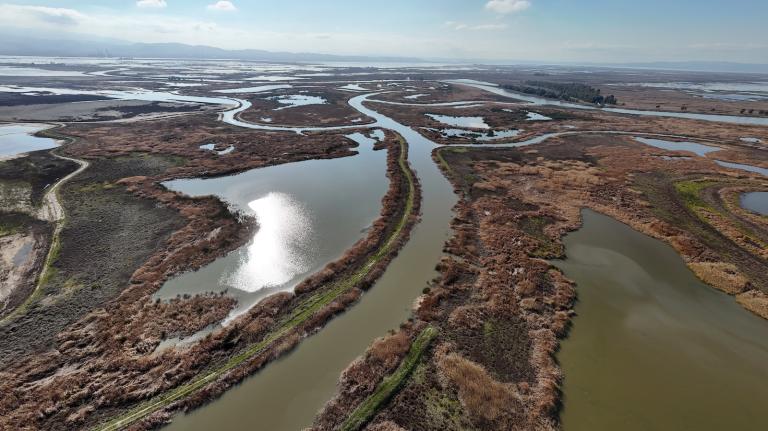First things first: The Obama administration today finalized greenhouse gas emissions standards for cars and light trucks first proposed last May. The practical upshot of the rules is a roughly 40 percent rise in fuel economy, to 35.5 miles per gallon, by 2016. The government said the measures would save owners about $3,000 in fuel over a vehicles lifetime, but add a grand on average to sticker prices.
Of drills and bills: Energy independence has attracted bipartisan support and high-level media interest at least since 1948, when the U.S. first became a net importer of oil. Calls for freedom from foreign energy sources (or for “energy security” among the more sober-minded) have grown particularly acute in recent years. Former Alaska Governor Sarah Palin popularized the chant, “Drill, baby, drill!” during the 2008 presidential campaign. Former Speaker of the House Newt Gingrich contributed “Drill here. Drill now. Pay Less.” Democrats have weakened in their rhetorical opposition to domestic offshore oil exploration as these slogans took off.
Politics can do funny things to strident partisan positions. Obama’s announcement this week on off-shore drilling might not be any more surprising than President George W. Bush’s re-purchase of oil-and-gas-leases off the Florida coast, during his brother’s, Gov. Jeb Bush, re-election bid. (“At the time, Bush’s decision was hailed by some environmental groups.”) Blood and electoral politics run thicker than oil.
The question, squarely framed by the New York Times, is, Will Obama’s political jujitsu work? Howard Kurtz, media critic of the Washington Post, runs amused through the top papers’ takes, from the NYT’s “nobody-much-likes-it” to the Los Angeles Times’ “this-won’t-accomplish-much” to right-wing pundit Don Surber’s observation that “Still, it is an admission by Obama that Sarah Palin was right.” He repeats the last four words about 125 times over a full browser page.
Sen. Lindsey Graham (R-S.C.), a key architect of the climate-and-energy bill expected in mid-April, said yesterday that Obama’s drilling proposal is a “good first step,” echoing other calls from Senate Republicans that the sale of drilling leases be expanded to include the eastern Gulf of Mexico, the West Coast, and Alaska. Graham and Lieberman at the end of last week chatted with reporters about two elements of their developing climate bill. Utilities would participate in a market for carbon-emission permits, and the oil industry would have to pay a “fixed fee” for their carbon emissions. Last week 10 coastal Democratic senators sent a letter to Obama admonishing the administration against “unfettered” drilling. Watch to see if Obama’s drilling announcement this week is sufficiently fettered.
Traders to the cause: The 2009 results of the E.U.’s Emissions Trading System are drawing scrutiny. Analysts attribute to reduced economic activity an 11.2 percent drop in E.U. industrial greenhouse gas emissions, a number that falls at the high end of expectations. Critics say industrial firms that receive pollution credits for free are benefitting from cyclical market dynamics, instead of permanently reducing emissions by deploying clean energy technologies. The decline in carbon prices, reflecting the recession and diminished outlook for a global treaty, have led to carbon trading firms’ disappearance from HSBC’s index of companies involved in climate solutions.
E.U. authorities have stepped up enforcement of about $6.75 billion in tax fraud they suspect within the trading system. Spanish police arrested nine people suspected of running a “carousel fraud.” In this scheme, traders buy credits in one E.U. country without paying a value-added tax, and sell them in another country at a price that includes the price of a tax.
It’s confusing enough without the outright accusations of fraud. An executive board that oversees a carbon-finance program set up by the Kyoto Protocol has suspended four auditors in a year and three months. The most recent companies penalized are carbon-market auditors in Germany and South Korea, who may now seek clarification on the market’s rules.
Against the backdrop of sagging carbon credit prices in Europe, a group of economists led by the Stockholm Environment Institute’s Frank Ackerman and Elizabeth Stanton in the U.S., suggests that target costs of greenhouse gas pollution are too low to effect the scale of change that many scientists call for.
More ‘sunlight’ in climate science: The U.K. Parliament’s Science and Technology Committee issued findings from its investigation into climatologists’ behavior as documented in emails hacked out of University of East Anglia servers last fall. The Members of Parliament, as many others before them, found little or nothing in the episode to weaken the evidence that suggests industrialization waste is transforming the global climate. But they slammed the climate scientists as a group for secretive handling of data. The MPs heavily faulted the university itself for the scientists’ poor responsiveness to Freedom of Information Act requests. Phil Jones, who stepped down temporarily under fire as director of the UEA’s Climate Research Unit, was exonerated by the committee. Newspapers, such as the Guardian, tack on garden-variety “he-said, she-said” evaluations of the report.
Data’s gotta come from somewhere: Obama’s 2011 budget proposes increased funding for NASA’s aging Earth observation infrastructure—62 percent more by the end of 2015. The investments would shore up data streams on ocean temperature, ice extent, ozone, and anthropogenic carbon emissions.
Satellite monitoring would be much easier if the risks of launching tin cans to space weren’t so high. NASA expects to rebuild its Orbiting Carbon Observatory (OCO), after the initial model fell into far-southern waters. The OCO may be the best-named satellite ever. A triple pun, OCO is a normal acronym, a chemical diagram (carbon dioxide is a linear molecule, O=C=O), and a homophone of the Polish word for “eye.” This week Europe will launch its CryoSat-2, a device precise enough to measure changes in ice thickness within “a few centimeters” accuracy. The first iteration, CryoSat, was destroyed in a launch failure five years ago. This week’s most thought-provoking statement from a scientist occurs in the Nature story (see previous link) about CryoSat-2:
Technical problems with the rocket have already delayed the launch, which was originally scheduled for February. “I hope this time around probability is on our side,” says Duncan Wingham, CryoSat-2’s principal scientist, who will watch the launch from the European Space Operations Centre of the European Space Agency (ESA) in Darmstadt, Germany.
Beware of dueling headlines:
Green economy grows despite policy vacuum(DailyClimate.org)
Where have all the green jobs gone? (BBC News)
The truth is out there. Ernst & Young probes the renewables market in greater detail. A third of the jump in U.S. climate spending came from last year’s stimulus bill, according to a Congressional Budget Office report.
There’s something up there… What do people think about climate change who rarely think about climate change? A minor indication came this week in a Washington Post book review of Ian McEwan’s new novel Solar (NB: The first paragraph of the review has an adult theme). The third paragraph addresses global warming:
The subject, though, is hot. Whether or not carbon dioxide is accumulating in the atmosphere, there’s no denying that novelists are warming up to the subject.
Perhaps I’m over-thinking this, but how is it intelligible to pose the question, even in a dependent clause, “whether or not carbon dioxide is accumulating in the atmosphere”? Certainly, there is carbon dioxide coming out of our tailpipes, smoke stacks, and melting permafrost. Maybe what’s accumulating in the air is something that has the same spectral and biochemical properties as carbon dioxide, but isn’t actually carbon dioxide.
At any rate, something that behaves identically to carbon dioxide is doing this. “Should” the author of the review (an editor) know that, even as a cute framing device, this dependent clause has negative communicative value?
Eric Roston is Senior Associate at the Nicholas Institute and author of The Carbon Age: How Life’s Core Element Has Become Civilization’s Greatest Threat. Prologue available at Grist. Chapter about Ginkgo biloba and climate change available at Conservation.
The Climate Post offers a rundown of the week in climate and energy news. It is produced each Thursday by Duke University’s Nicholas Institute for Environmental Policy Solutions.


